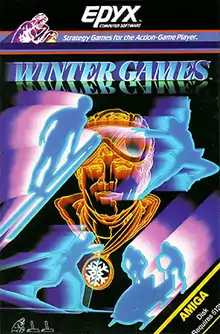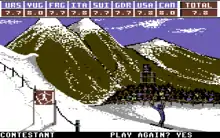Winter Games
Winter Games is a sports video game developed by Epyx (and released in Europe by U.S. Gold), based on sports featured in the Winter Olympic Games.
| Winter Games | |
|---|---|
 Amiga cover art | |
| Developer(s) | Epyx Action Graphics (C64) Free Radical Software (Atari ST, Amiga) Atelier Double (Famicom Disk System/NES) |
| Publisher(s) | Epyx (US), U.S. Gold (EU) Acclaim (NES) Pony Canyon (Famicom Disk System) |
| Programmer(s) | Richard A. Ditton (C64, Amiga, Atari ST) Elaine Hodgson (Amiga, Atari ST) Chris Oberth (Apple II) |
| Artist(s) | Lonnie D. Ropp (C64) Michael Kosaka (C64) Timothy Skelly (Atari ST, Amiga) |
| Composer(s) | David Thiel Kenichi Tomizawa (Famicom Disk System/NES) |
| Platform(s) | Amiga, Apple II, Atari ST, Apple IIGS, Amstrad CPC, ZX Spectrum, PC, Atari 2600, Atari 7800, C64, NES, Famicom Disk System, Virtual Console, Apple Macintosh |
| Release | 1985 |
| Genre(s) | Sports game |
| Mode(s) | Single-player |
A snow-and-ice themed follow-up to the highly successful Summer Games, Winter Games was released in 1985 for the Commodore 64 and later ported to several popular home computers and video game consoles of the 1980s.
The game was presented as a virtual multi-sport carnival called the "Epyx Winter Games" (there was no official IOC licensing in place) with up to 8 players each choosing a country to represent, and then taking turns competing in various events to try for a medal.
Events
The events available vary slightly depending on the platform, but include some or all of the following:
- Alpine skiing
- Ski jumping
- Biathlon
- Bobsled
- Figure skating
- Speed skating
- Luge
- Freestyle skiing; more precisely, the aerial skiing discipline, called "Hot Dog Aerials" in the game
The game allowed you to compete in all of the events sequentially, choose a few events, choose just one event, or practice an event.
Ports

Winter Games was ported to the Amiga, Apple II, Atari ST, Apple Macintosh, Apple IIGS, Amstrad CPC, ZX Spectrum, and DOS computer platforms, and to the Atari 2600, Atari 7800, Nintendo Entertainment System, and the Family Computer Disk System video game consoles. In 2004, it was featured as one of the games on the C64 Direct-to-TV. A Virtual Console version was released in Europe on February 20, 2009.
Reception
Winter Games was Epyx's best-selling Commodore game as of late 1987.[1] Its sales had surpassed 250,000 copies by November 1989.[2]
Info rated Winter Games four-plus stars out of five, stating that each event was good enough to be sold separately, and concluding that it was "Sports simulation at its best!".[3] In 1985 Zzap!64 gave 94% for the game calling it "another classic sport simulation from Epyx". Lemon64 website users have given average vote of 8.6 which places the game on top 20 list on the site. The game was reviewed in 1988 in Dragon #132 by Hartley, Patricia, and Kirk Lesser in "The Role of Computers" column. The reviewers gave the game 3½ out of 5 stars.[4] The Spectrum version topped the charts for the month of April.[5] However, the NES and Famicom Disk System versions were critically panned for unresponsive controls, abysmal music and poor graphics.
In 1996, Next Generation listed the "Games" series collectively as number 89 on its "Top 100 Games of All Time". The magazine stated that though the games had great graphics for their time, their most defining qualities were their competitive multiplayer modes and "level of control that has yet to be equaled".[6]
References
- Ferrell, Keith (December 1987). "The Commodore Games That Live On And On". Compute's Gazette. pp. 18–22. Retrieved 24 January 2015.
- Staff (November 1989). "Chart-Busters; SPA Platinum". Game Players (5): 112.
- Dunnington, Benn; Brown, Mark R. (December 1985 – January 1986). "C-64/128 Gallery". Info. pp. 4–5, 88–93. Retrieved 2019-03-19.
- Lesser, Hartley; Lesser, Patricia; Lesser, Kirk (April 1988). "The Role of Computers". Dragon (132): 80–85.
- "The YS Rock'n'Roll Years - Issue 4". Ysrnry.co.uk. Archived from the original on 2000-11-21. Retrieved 2012-12-06.
- "Top 100 Games of All Time". Next Generation. No. 21. Imagine Media. September 1996. p. 39.
External links
- Winter Games at MobyGames
- Winter Games: Package and Manual Scans Images of Winter Games box, manual and screen shots at c64sets.com
- Winter Games at SpectrumComputing.co.uk
- The Atari 2600 version of Winter Games can be played for free in the browser at the Internet Archive
